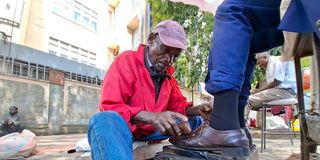My life as a shoe shiner, 48 years on

Peter Mwangi keenly brushes the shoes of his client outside Telkom house in Nakuru city on October 2, 2024.
Every day, at precisely 6:45 in the morning, Peter Mwangi sets up his base under a tree, patiently waiting for customers seeking his shoe shining services, before closing at exactly 6:30 p.m.
We ask how he's persevered in his work, to which he responds, “Shoe shining is a job that can last depending on how passionately you do it. It's a job that requires dedication and should be done wholeheartedly, just like any other work.”
Mwangi explains that his dependency on the job stems from it being his primary source of income.
Over time, due to the rising cost of living, the job has adapted to current economic realities.
“I started this job in 1976, and back then I'd charge Sh. 20. As life has changed and the cost of living has increased, I've had to adjust my prices gradually from 20 to 30, then 40, and now Sh. 50,” he says.
While customer traffic fluctuates, Mwangi notes that it's unpredictable.
“We can have as many as 20-30 customers per day, or as few as five. There's no guarantee,” he explains.
His clientele is a mix of both the elderly and the youth.
For the last four decades, Mwangi has worked as one of the regular shoe shiners outside Telkom House along Moi Road.
While he may not have a business name to identify him, three tall chairs with cushions, three men, and an open cart with shoe polish, laces, announce his presence under the aged trees.
Like Mwangi, Benson Murima too has had to diversify his job to serve a larger clientele.
The shoe shiner cum repairer notes that since he started in 2017, a lot has changed including the trends in fashion, which has in one way or another affected the job.
"Not long ago, people would wear more official clothes and shoes but now, people are leaning more towards casual shoes," Murima says.
He additionally notes that the make of shoes has also changed over time with now the most common being shoes made from lexine leather and cloth, hence a reduction in pure leather shoes.
"With more people turning towards these kinds of shoes, our work over time has reduced too."
As this happens, Murima notes that the price of shining shoes has increased overtime.
Like his counterpart, he too comes in early to work, by 7 a.m and closes by 6:30 p.m, noting that client traffic is usually a bit hectic in the mornings and more so on weekdays compared to the weekends.
"I usually have a lot of customers during the rainy season compared to when it's dusty. This is because during the latter, customers come and request for brushes and dust off their shoes themselves hence earning me nothing," Murima says.
His greatest challenge he adds is being out in open air as he always has to have an umbrella to weather both the scorching sun and rainy weather.
Murima says he wishes to have a designated area to store his things and even that of his clients, for assured safety.
